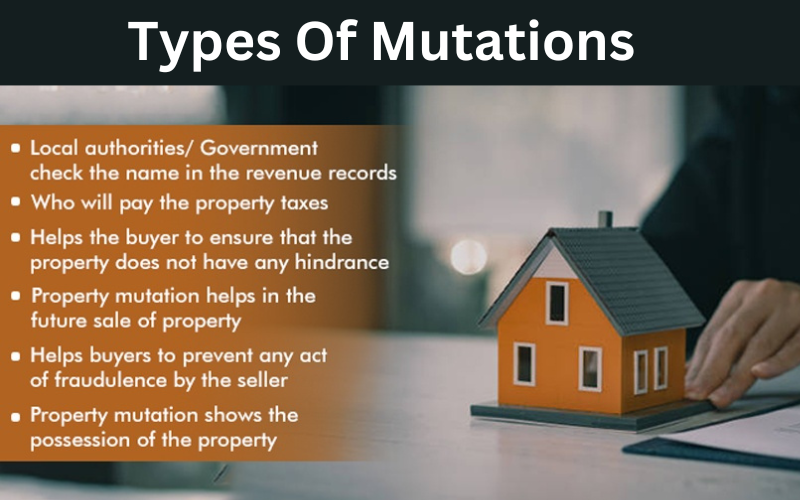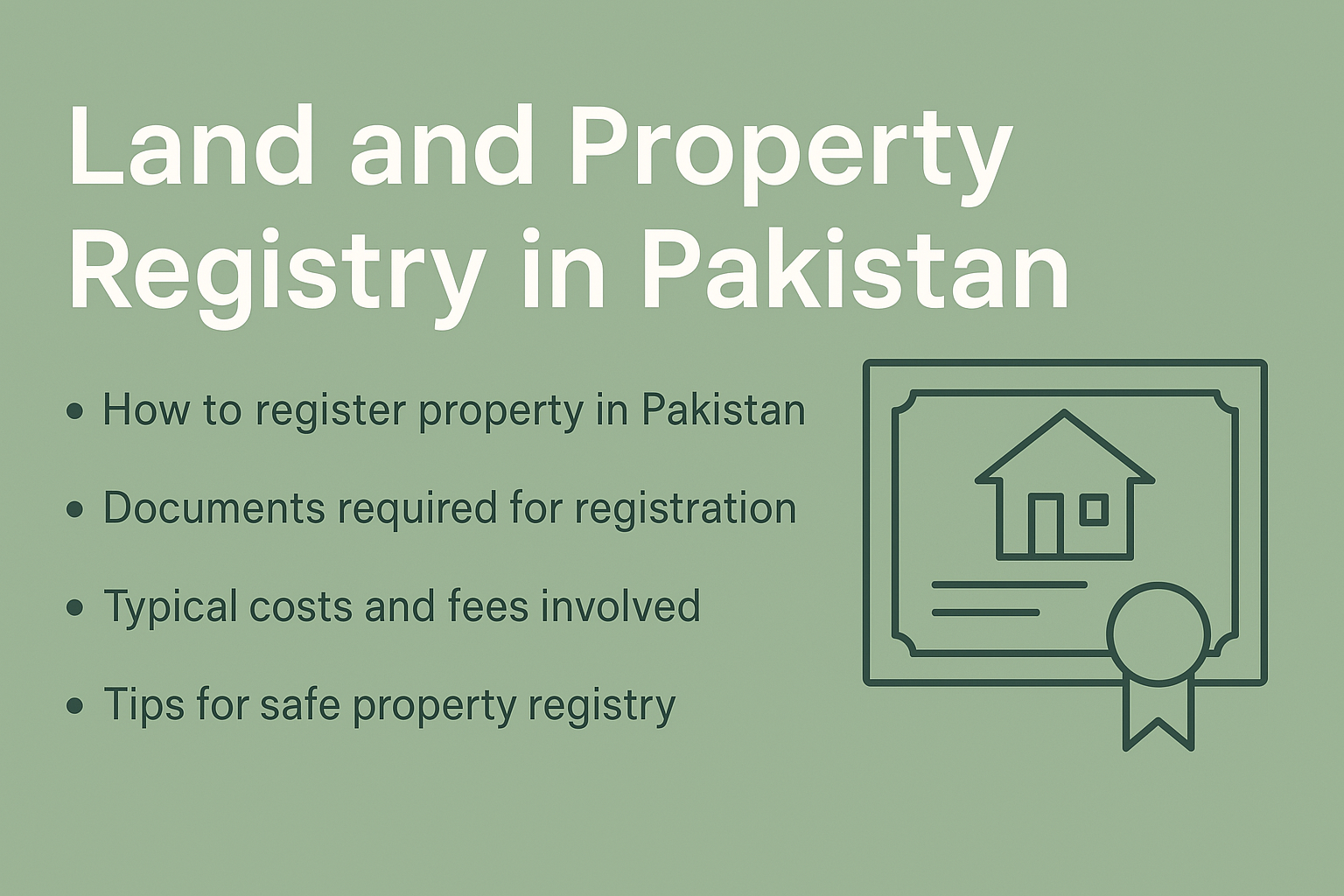If you’re planning to buy, sell, inherit, or invest in property in Pakistan, understanding land and property registry is crucial. Without proper registration, your ownership rights may be questioned, leading to legal disputes or even fraud. Unfortunately, many people get stuck because the property registration process sounds complicated — but it doesn’t have to be.
This guide will walk you through everything you need to know about the land and property registry in Pakistan in clear, simple terms. Whether you’re dealing with a city plot or rural farmland, we’ll explain how registration works, why it matters, and how to protect yourself from common scams.
What is the Land and Property Registry in Pakistan?
In Pakistan, land and property registry refers to the official recording of ownership rights over immovable property (land, plots, homes, farms, etc.) in government records. When you register a property, your name is legally recognized as the owner.
The land registry system is primarily managed by local District Registrar offices under the Provincial Board of Revenue. After registration, you receive a registered sale deed (Registry) proving your lawful ownership.
Why is Property Registration Necessary?
Property registration in Pakistan isn’t just a formality — it’s your legal protection. Here’s why:
- Legal Proof of Ownership: A registered property deed is the only official evidence that you own the property.
- Prevention of Fraud: Registration prevents illegal sales, double selling, or forgery.
- Transfer of Rights: Only registered property can be legally sold, gifted, or inherited.
- Loan or Mortgage: Banks require a registered deed to approve property-backed loans.
- Government Recognition: Unregistered property has no legal standing in court disputes.
Without proper property registration in Pakistan, your rights can easily be challenged.
How to Register Property in Pakistan: Step-by-Step Guide
The property registration process can differ slightly between urban and rural areas, but the basic steps are generally the same:

1. Verification of Land Title
Before purchasing, verify the land record in Pakistan. Confirm the seller’s ownership through:
- Fard (Record of Rights) from the local land revenue office.
- Online land record portals like Punjab Land Records Authority (PLRA) or Sindh Land Records Authority (SLRA).
2. Preparation of Sale Deed
Hire a lawyer to draft the Sale Deed (Bay Nama), which details the terms of the property transaction.
3. Payment of Stamp Duty and Registration Fee
Pay the following:
- Stamp Duty (1%-3% of property value depending on province)
- Registration Fee (typically 1%)
- Capital Value Tax (CVT) and Withholding Tax (depends on property type and buyer’s tax status)
Purchase the necessary stamp papers.
4. Visit the Sub-Registrar Office
Both buyer and seller must appear with:
- Original CNICs and copies
- 2 witnesses
- Completed Sale Deed
- Paid stamp papers
The Sub-Registrar will verify identities, review documents, and record thumb impressions.
5. Issuance of Registered Deed
After approval, the Sub-Registrar officially registers the Sale Deed, and you receive a Registry — your legal proof of ownership.
Rural vs. Urban Differences
| Aspect | Urban Areas | Rural Areas |
| Registration Authority | District Sub-Registrar | Tehsil or Patwari Office |
| Land Record Format | Digitized in many cities | Often manual but digitization ongoing |
| Stamp Duty Rate | Higher (based on DC rate) | Slightly lower |
Documents Required for Property Registration
Prepare these documents:
- Original Title Deed of the property
- CNIC copies of buyer, seller, and witnesses
- Fard (Ownership Certificate) issued within last 15 days
- No Objection Certificate (NOC) from the relevant authority (especially in housing societies)
- Sale Deed (drafted and signed)
- Paid Stamp Papers
- Tax Clearance Certificate (in some areas)
- Proof of Payment (Bank receipts or Pay Orders)
Land Record Digitization in Pakistan
Recognizing the need for transparency, the government has introduced land record digitization initiatives:

- Punjab Land Records Authority (PLRA): Offers online fard verification and property record search.
- Sindh Land Record Authority (SLRA): Digitizing rural and urban records.
- Khyber Pakhtunkhwa and Balochistan: Ongoing projects for computerized land management.
You can now access land records, verify ownership, and avoid fraud through official government portals.
✅ Tip: Always verify property ownership online before proceeding.
Typical Costs and Government Fees Involved
Here’s an idea of typical charges:
- Stamp Duty: 1%-3% of the property value
- Registration Fee: Around 1%
- Capital Value Tax (CVT): 2% of the property value (urban areas)
- Withholding Tax: 1%-2% for filers; 2%-4% for non-filers
- Miscellaneous Charges: Lawyer’s fees, NOC charges (if applicable)
Note: Rates vary by province and property type.
Registry vs Mutation: What’s the Difference?
Many people confuse Registry and Mutation (Intiqal), but they are not the same:

| Registry | Mutation |
| Official record of ownership | Change of ownership in land revenue records |
| Legal proof in civil courts | Administrative proof for taxation purposes |
| Issued by Sub-Registrar | Managed by Patwari/Tehsildar |
| Necessary for legal transactions | Necessary for tax and government records |
✅ In simple terms:
Registry = Legal ownership
Mutation = Tax record update
Both are important!
Common Problems and Scams (and How to Avoid Them)
Property dealings in Pakistan often face issues like:
- Fake Registries: Forged documents sold to multiple buyers.
- Double Selling: Same property sold to different people.
- Encroachments: Disputes over property boundaries.
To avoid scams:
- Always verify the seller’s documents through the land record authority.
- Never pay in cash without documentation.
- Consult a professional property lawyer.
- Physically inspect the property before buying.
- Use government online portals for record verification.
Real-World Tips for Safe Property Registry
- Hire a Trusted Lawyer: For sale deed drafting and due diligence.
- Use Online Verification: Check Fard and property records through PLRA, SLRA, etc.
- Insist on Witnesses: Always have 2 credible witnesses during registration.
- Document All Payments: Prefer bank transactions over cash.
- Consult Before Signing: Always review the Sale Deed thoroughly before submission.
Reforms and Digitization Efforts by the Government
The Pakistani government has taken major steps to modernize property transactions:
- Punjab Land Records Management & Information Systems Project: Made fard issuance easier and faster.
- Sindh’s Land Revenue Reforms: Introduced biometric verification for property sales.
- E-Registry Projects: Some cities allow partial online registration processes to reduce human interaction and corruption.
These reforms aim to ensure faster, safer, and more transparent property dealings.
FAQs about Land and Property Registry in Pakistan
Q1. How long does property registration take?
👉 Typically 2–4 weeks if all documents are complete.
Q2. Can I check property ownership online in Pakistan?
👉 Yes! Use the PLRA portal (Punjab) or SLRA website (Sindh) for online verification.
Q3. Is property registration mandatory?
👉 Yes. Unregistered property cannot be legally sold or mortgaged.
Q4. What is the cost of property registration in Pakistan?
👉 It varies by province but expect to pay around 3%-5% of the property value in total government charges.
Q5. What happens if a property is not registered?
👉 You risk losing ownership rights and cannot legally enforce claims.
Final Thoughts
The land and property registry in Pakistan is not just a legal formality — it’s your shield against fraud, disputes, and financial loss. With increasing digitization, verifying land records and registering properties is becoming easier and more transparent. Always follow legal procedures, verify records carefully, and consult experts when needed.
Disclaimer:
This article is for informational purposes only. Always verify the latest local property laws and consult a qualified property lawyer before finalizing any transaction.



Leave a Reply